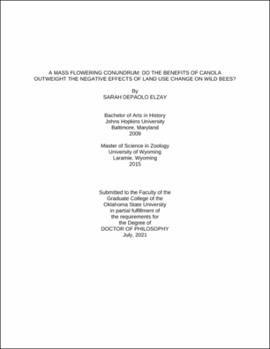| dc.contributor.advisor | Baum, Kristen | |
| dc.contributor.author | Elzay, Sarah DePaolo | |
| dc.date.accessioned | 2022-01-21T19:19:50Z | |
| dc.date.available | 2022-01-21T19:19:50Z | |
| dc.date.issued | 2021-07 | |
| dc.identifier.uri | https://hdl.handle.net/11244/333752 | |
| dc.description.abstract | In light of the burgeoning human population, the conservation of ecosystems services that sustain agricultural production, such as pollination, is essential. Wild bees are important pollinators of many crops and wild flowering plants. However, agricultural intensification reduces nesting and foraging resources for wild bees and is a major contributor to their decline worldwide. Mass flowering crops may increase foraging resources that support wild bees. In the southern Great Plains canola (Brassica napus L.) was introduced in the early 2000s as a rotational crop with winter wheat and greatly increases foraging resources for wild bees in this historically forage-poor region. In turn, wild bees are known to improve canola seed set. The addition of canola may enhance or dilute pollination of wild flowering plants. Despite increased foraging resources from canola, agroecosystems in the southern Great Plains may not provide sufficient nesting habitat for wild bees, potentially outweighing the benefit of increased foraging resources. Our research demonstrated that increased canola cover is associated with increased wild bee abundance and richness across the growing season and wild bee pollination significantly improved canola seed set in this this study system. Three species of wild plants increased in seed set as canola cover increased, suggesting that canola may cause pollination service spillover. We also found that increased anthropogenic land use cover is negatively correlated with wild bee abundance and richness and, further, affected the body size of three wild bee populations. Canola plays an important role in the agroecosystems of the southern Great Plains and may be an important resource to wild bees in this region. | |
| dc.format | application/pdf | |
| dc.language | en_US | |
| dc.rights | Copyright is held by the author who has granted the Oklahoma State University Library the non-exclusive right to share this material in its institutional repository. Contact Digital Library Services at lib-dls@okstate.edu or 405-744-9161 for the permission policy on the use, reproduction or distribution of this material. | |
| dc.title | Mass flowering conundrum: Do the benefits of canola outweigh the negative effects of land use change on wild bees? | |
| dc.contributor.committeeMember | Wilson, Gail | |
| dc.contributor.committeeMember | Fuhlendorf, Sam | |
| dc.contributor.committeeMember | Elliott, Norman | |
| osu.filename | Elzay_okstate_0664D_17324.pdf | |
| osu.accesstype | Open Access | |
| dc.type.genre | Dissertation | |
| dc.type.material | Text | |
| dc.subject.keywords | agricultural intensification | |
| dc.subject.keywords | bee-plant mutualisms | |
| dc.subject.keywords | canola | |
| dc.subject.keywords | mass flowering crop | |
| dc.subject.keywords | wild bees | |
| thesis.degree.discipline | Integrative Biology | |
| thesis.degree.grantor | Oklahoma State University | |
